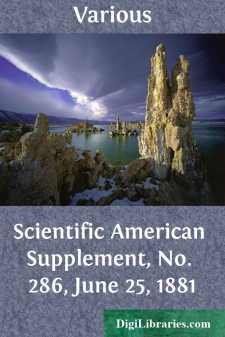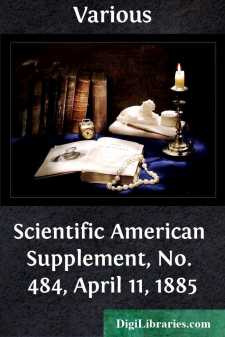Categories
- Antiques & Collectibles 13
- Architecture 36
- Art 48
- Bibles 22
- Biography & Autobiography 813
- Body, Mind & Spirit 142
- Business & Economics 28
- Children's Books 14
- Children's Fiction 11
- Computers 4
- Cooking 94
- Crafts & Hobbies 4
- Drama 346
- Education 46
- Family & Relationships 57
- Fiction 11828
- Games 19
- Gardening 17
- Health & Fitness 34
- History 1377
- House & Home 1
- Humor 147
- Juvenile Fiction 1873
- Juvenile Nonfiction 202
- Language Arts & Disciplines 88
- Law 16
- Literary Collections 686
- Literary Criticism 179
- Mathematics 13
- Medical 41
- Music 40
- Nature 179
- Non-Classifiable 1768
- Performing Arts 7
- Periodicals 1453
- Philosophy 64
- Photography 2
- Poetry 896
- Political Science 203
- Psychology 42
- Reference 154
- Religion 513
- Science 126
- Self-Help 84
- Social Science 81
- Sports & Recreation 34
- Study Aids 3
- Technology & Engineering 59
- Transportation 23
- Travel 463
- True Crime 29
The Aldine, Vol. 5, No. 1., January, 1872 A Typographic Art Journal
by: Various
Categories:
Description:
Excerpt
MILLERISM.
Toward the close of the last century there was born in New England one William Miller, whose life, until he was past fifty, was the life of the average American of his time. He drank, we suppose, his share of New England rum, when a young man; married a comely Yankee girl, and reared a family of chubby-cheeked children; went about his business, whatever it was, on week days, and when Sunday came, went to meeting with commendable regularity. He certainly read the Old Testament, especially the Book of Daniel, and of the New Testament at least the Book of Revelation. Like many a wiser man before him, he was troubled at what he read, filled as it was with mystical numbers and strange beasts, and he sought to understand it, and to apply it to the days in which he lived. He made the discovery that the world was to be destroyed in 1843, and went to and fro in the land preaching that comfortable doctrine. He had many followers—as many as fifty thousand, it is said, who thought they were prepared for the end of all things; some going so far as to lay in a large stock of ascension robes. Though no writer himself, he was the cause of a great deal of writing on the part of others, who flooded the land with a special and curious literature—the literature of Millerism. It is not of that, however, that we would speak now.
But before this Miller arose—we proceed to say, if only to show that we are familiar with other members of the family—there was another, and very different Miller, who was born in old England, about one hundred years earlier than our sadly, or gladly, mistaken Second Adventist. His Christian name was Joseph, and he was an actor of repute, celebrated for his excellence in some of the comedies of Congreve. The characters which he played may have been comic ones, but he was a serious man. Indeed, his gravity was so well known in his lifetime that it was reckoned the height of wit, when he was dead, to father off upon him a Jest Book! This joke, bad as it was, was better than any joke in the book. It made him famous, so famous that for the next hundred years every little bon mot was laid at his door, metaphorically speaking, the puniest youngest brat of them being christened "Old Joe."
After Joseph Miller had become what Mercutio calls "a grave man," his descendants went into literature largely, as any one may see by turning to Allibone's very voluminous dictionary, where upwards of seventy of the name are immortalized, the most noted of whom are Thomas Miller, basket-maker and poet, and Hugh Miller, the learned stone-mason of Cromarty, whose many works, we confess with much humility, we have not read. To the sixty-eight Millers in Allibone (if that be the exact number), must now be added another—Mr. Joaquin Miller, who published, two or three months since, a collection of poems entitled "Songs of the Sierras." From which one of the Millers mentioned above his ancestry is derived, we are not informed; but, it would seem, from the one first-named....












